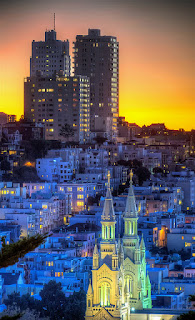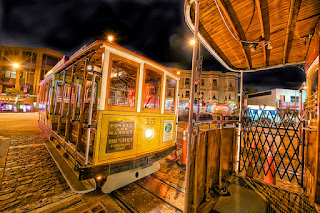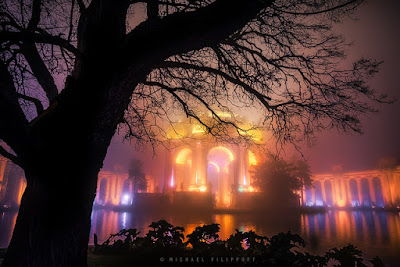In our regular series, international writers share some snapshots from their part of the world. This issue, Max Orkis shows us around San Francisco and the Bay Area. All images by Michael Filippoff.
 |
What’s so great about San Francisco?
San Francisco’s easy to ditch. With surfing along the coast, cushy-green suburbia all around, national parks, skiing resorts, and wine country a short drive away, the perfect escape plan is ripe for the picking.
Getting the hell out is a moot freedom. The city’s a cultural supermarket. It rocks a number of important museums, a vibrant art scene, high-profile performances, and colorful musical traditions. This place caters to all kinds of lifestyles, gastronomic proclivities, erotic appetites, intellectual interests, wellness weaknesses, addictions and obsessions, spiritual pursuits, fitness needs, political bullshit, and other entertainment cravings.
Tell us a bit about the cultural life of the place.
San Francisco offers many more literary attractions than a Joe Schmo supporting his own writing habit in this prohibitively costly region should ever have time to enjoy. You’ve got your university programs, workshops, critique groups, and conferences. You’ve got your publishers, periodicals, and agents. You’ve got events like Litquake and other readings, signings, and poetry slams. You’ve got seductive libraries, bookshops such as City Lights, and bohemian cafés and bars. The floor in Vesuvio, a legendary beatnik hangout, is still sticky from the sex revolution (it really is).
Like any other, this swank old town is home to those who consider the lands beyond its limits provincial. Well, the San Francisco Bay Area is ten times more populous and pregnant with that much more promise. A metropolis, mother city, is hard to conceive of without the progeny she has come to depend on. In the past decades, tech, or the so-called Silicon Valley, overran and incorporated the quaint hipster capital. Think Roman conquest and enslavement of the Hellenic world, which ensured the preservation and continued spread of Greek civilization.
Many of us do tend to be accommodating, accepting, and open-minded, except when it comes to toponyms. Around here, folks refer to the municipality as San Francisco or the City and to the counties group-hugging it as the Bay Area. This protectiveness reminds me of the Judaic doting on G-d’s name.
What’s hot? What are people reading?
An annual series of events, One City One Book, has been going on under the auspices of the San Francisco Public Library for the past ten years. Eponymously, members of the community read the same work during a given period and discuss it in book clubs.
Here are the last few years’ selections: David Talbot’s Season of the Witch, Armistead Maupin’s Tales of the City, and Cory Doctorow’s Little Brother – all to do with, about, or set in San Francisco.
Can you recommend any books set in the city?
 Of the volumes of text about the San Francisco Bay Area, including screenplays, I have (maybe I should use a pen name?) added these novels to my reading list:
Of the volumes of text about the San Francisco Bay Area, including screenplays, I have (maybe I should use a pen name?) added these novels to my reading list: Telegraph Avenue by Michael Chabon (set in Berkeley) – because I love The Mysteries of Pittsburgh and his other books
The Maltese Falcon by Dashiell Hammett – I checked out excerpts in a writing course and remember being impressed by his style
San Francisco Stories by Jack London – I dug White Fang and his other prose as a kid
A Heartbreaking Work of Staggering Genius by Dave Eggers (sounds interesting)
On the Road by Jack Kerouac (I’m actually reading it right now – it didn’t blow me away at the beginning, but his characterization is starting to grow on me, like pot on a plot)
Who are the best-known local writers?
Here’s a mostly off-the-top-of-my-head list of Bay Area writers, poets, and dramatists (I wonder what it says about me). Some are native, while others we proudly claim.
Mark Twain (adopted)
Robert Frost
John Steinbeck (Salinas)
Michael Chabon (Berkeley, adopted)
 Jack London
Jack London Henry Miller (Big Sur, adopted)
Ken Kesey (Peninsula, South Bay, adopted)
Francis Ford Coppola (Napa, adopted)
Sofia Coppola
Maxine Hong Kingston (East Bay)
Dashiell Hammett (adopted)
Khaled Hosseini (San Jose, adopted)
George Lucas
Allen Ginsberg (adopted)
Jack Kerouac (adopted)
Ursula K. Le Guin (Berkeley)
This line-up illustrates how San Francisco is a body others gravitate towards, which makes it more than the sum of its parts.
Is the location an inspiration or distraction for you?
This environment is psychoactive. The San Francisco skyline echoes the hills which mimic the ocean waves. Buildings stick out of the seedbeds along the booming and busting ridges, like notes in sheet music. Rows of toothy roofs underline the clouds. Much of the time, you sketch these images from memory, guess them into being from behind the fog.
I find no part of this ecosystem, not even its panem et circenses, distracting. Nothing can keep me from staring back at a blank page until it’s time to watch the next episode of HBO’s Silicon Valley or argue with someone online.
In all seriousness, though, some of my stories take place in the Bay Area, and many of my poems could never have happened elsewhere.
What are you writing?
I’m working on a feature screenplay (a comedy set in San Francisco) and brainstorming my first attempt on a novel.
My non-fiction and short stories: http://max-orkis.blogspot.com/
Sum up life in San Francisco in three words.
Fusion, diffusion, confusion
_______________
After about ten years in Western Europe, Max Orkis is back in the Bay Area, where he lives with his family. At parties, Max tells people he had to go away for a while. He used to proofread and teach English (actually, it may have been the other way around). Now he works as a writer/editor in a high-tech company. Max’s biography remains incomplete.
With grateful thanks to Michael Filippoff for all photographs






Why do teachers give homework? Students never tire to ask this question. Click the link to read more.
ReplyDelete🍛 Indian restaurant Lewes is a true gem for anyone who loves authentic Indian flavors. The moment you step inside, you’re greeted with the rich aroma of freshly ground spices and the warm hospitality that makes every visit unforgettable. 🌶️
ReplyDelete